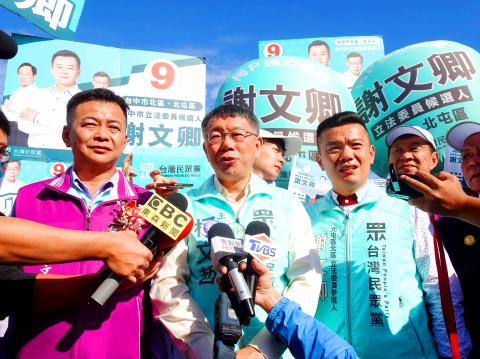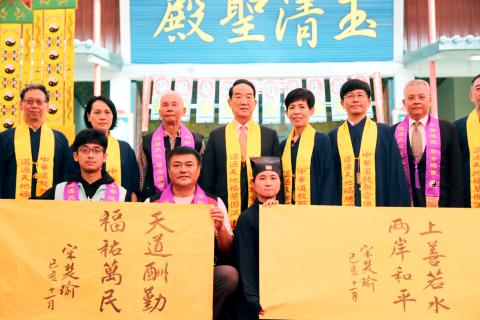Taipei Mayor Ko Wen-je (柯文哲), chairman of the Taiwan People’s Party (TPP), yesterday said that he supports the purpose of the anti-infiltration bill proposed by the Democratic Progressive party (DPP), but its content requires further discussion before it is passed.
The DPP has said it aims to pass the third reading of the draft on Dec. 31. It advanced to a second reading last month.
The 12-article draft would subject those who disrupt the social order under the command or at the request of “infiltration sources” to a prison term of up to seven years or a fine of NT$5 million (US$165,508), and prohibits anyone from donating to a political party, influencing elections, proposing the recall of a government official or launching a public referendum on the instructions or with the financial support of an “infiltration source.”

Photo: Chang Ching-ya, Taipei Times
“The intention behind drafting the act is okay,” Ko said yesterday on the sidelines of a campaign event for TPP legislative candidate Hsieh Wen-ching (謝文卿) in Taichung.
“For sure everyone supports the idea of preventing foreign infiltration from influencing Taiwanese politics and elections, so I support the purpose of the act,” Ko said.
However, the key point to consider is that the act would regulate Taiwanese citizens and businesspeople in China, so there should be adequate discussion about possible problems enforcing the law, he said.

Photo: Cheng Ming-hsiang, Taipei Times
Ko said when he made a similar remark on Friday, some reports and people online described him as being against the act, which he thought was “misleading.”
Ko on Friday said that the bill should not be passed without sufficient discussion, because if it was passed without a clear understanding on how it would be enforced, it would make many Taiwanese citizens feel anxious and worry about whether they were breaching the law.
Separately yesterday, People First Party Chairman and presidential candidate James Soong (宋楚瑜) said he disagrees with the draft.
“More than 2 million Taiwanese businesspeople are working hard in China to make a living for their families,” he said. “They are all our fellow citizens and should not be viewed as enemies.”
“If cross-ministerial coordination, sufficient understanding or verification of accusations cannot be achieved, allowing the act to be passed in such a hurry will affect the government’s credibility and be unfair to innocent citizens,” he said.
There is less than a month until the elections, which would represent what the latest public opinion was, so arbitrarily trying to pass the draft at this time would be controversial, Soong said.
He urged the DPP not to insist on passing the bill hastily for election gains, saying that the party should exercise restraint or it could face unsettling consequences.
Additional reporting by Cheng Ming-hsiang

Alain Robert, known as the "French Spider-Man," praised Alex Honnold as exceptionally well-prepared after the US climber completed a free solo ascent of Taipei 101 yesterday. Robert said Honnold's ascent of the 508m-tall skyscraper in just more than one-and-a-half hours without using safety ropes or equipment was a remarkable achievement. "This is my life," he said in an interview conducted in French, adding that he liked the feeling of being "on the edge of danger." The 63-year-old Frenchman climbed Taipei 101 using ropes in December 2004, taking about four hours to reach the top. On a one-to-10 scale of difficulty, Robert said Taipei 101

Nipah virus infection is to be officially listed as a category 5 notifiable infectious disease in Taiwan in March, while clinical treatment guidelines are being formulated, the Centers for Disease Control (CDC) said yesterday. With Nipah infections being reported in other countries and considering its relatively high fatality rate, the centers on Jan. 16 announced that it would be listed as a notifiable infectious disease to bolster the nation’s systematic early warning system and increase public awareness, the CDC said. Bangladesh reported four fatal cases last year in separate districts, with three linked to raw date palm sap consumption, CDC Epidemic Intelligence

Two Taiwanese prosecutors were questioned by Chinese security personnel at their hotel during a trip to China’s Henan Province this month, the Mainland Affairs Council (MAC) said yesterday. The officers had personal information on the prosecutors, including “when they were assigned to their posts, their work locations and job titles,” MAC Deputy Minister and spokesman Liang Wen-chieh (梁文傑) said. On top of asking about their agencies and positions, the officers also questioned the prosecutors about the Cross-Strait Joint Crime-Fighting and Judicial Mutual Assistance Agreement, a pact that serves as the framework for Taiwan-China cooperation on combating crime and providing judicial assistance, Liang

US climber Alex Honnold left Taiwan this morning a day after completing a free-solo ascent of Taipei 101, a feat that drew cheers from onlookers and gained widespread international attention. Honnold yesterday scaled the 101-story skyscraper without a rope or safety harness. The climb — the highest urban free-solo ascent ever attempted — took just more than 90 minutes and was streamed live on Netflix. It was covered by major international news outlets including CNN, the New York Times, the Guardian and the Wall Street Journal. As Honnold prepared to leave Taiwan today, he attracted a crowd when he and his wife, Sanni,